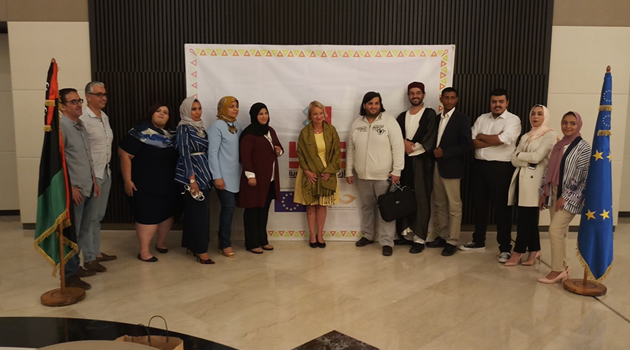European Union and Jusoor Centre award prizes of the Erth Contest to support creative sector in Libya
The closing ceremony of the EU funded project ''Culture Links: Celebrating Libya's Creativity'' took place on 30 August, as part of EU efforts to promote art and culture as a tool to for reconciliation in Libya.
During the event, the jury awarded the prize of 3000 euros to Khalifa Bashbash for his project "History of Libya"
Ambassador Bettina Muscheidt, the Head of the Delegation of the European Union, underlined that:
"The EU Delegation to Libya is proud to support the dreams of Libyan people from the cultural and creative sectors. Theirs is the language of culture, binding us all beyond borders in our shared humanity.
"This language will speak to both Libyans and the EU as its neighbor. Today we pay tribute to those Libyans working in the cultural and creative sectors for their positive energy, for not losing faith in the value of artistic expression even though Libya goes through such difficult times.
"Libya's artists and those working in creative industries do both: they preserve Libya's rich heritage and tradition while being Libya's best ambassadors for the future. The art works of the finalists that recently were exhibited in Tripoli and those we see today are a powerful testimony to this. These works are Libya's window to the world!''
The project, implemented by Jusoor Center for Studies and Development aims to promote cultural diversity, peace, tolerance and social cohesion among Libyans and promote the image of Libya in the world through changing the narrative about Libya.
Moreover the project promotes the concept of creative economy to support sustainable cultural activities in Libya.
The Erth Contest was initiated on 7 July 2018, calling Libyans to express the Libyan Identity through art, heritage and technology. Approximately 200 participants from all over the country submitted their proposals that were evaluated and the best ideas were presented in events that took place in three cities: Tripoli, Benghazi and Houn.
The 10 finalists were selected to attend bootcamp in Tunis on creative entrepreneurship, using art as a tool in peace building, training on digital marketing and how to use Technology to promote art and culture.
In the closing ceremony the finalists presented their cultural ideas and products in the wider audience. A jury composed of three composed by Libyans and EU officials selected the best project which was History of Libya.
(Source: EU)





